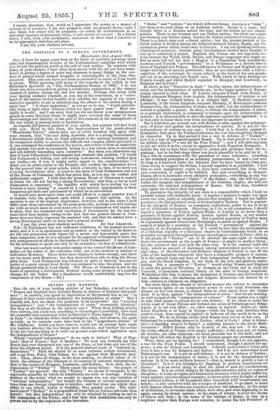THE OBSTACLE TO A STRONG GOVERNMENT.
Manchester, 21st August 1855.
SIR-I have for many years been in the habit of carefully perusing those calm and statesmanlike reviews of the Parliamentary campaign with which you favour the political world at the end of each session. In common with many of your readers, I have often been struck with the art you have mani- fested in giving a degree of order and clearness to many things in the con- duct of parties which seemed irregular or unintelligible at the time they occurred. This year you have not been so successful as usual, or I am worse to please. While agreeing with many of the remarks in the article in last Saturday's Spectator on "The Parliamentary Session of 1855," I do not think you have succeeded in giving a satisfactory explanation of the strange conduct of parties during the last few months. Perhaps this arises from your having confined yourself, as you say at the conclusion, to a "retro- spect of the session viewed broadly as it exhibits the capacity of our repre- sentative assembly to aid in administering the affairs of the nation during a great war." "A closer inspection," as you go on to say, "would undoubt- edly bring to light other features which we have passed over." Most cer- tainly it would ; and I am sorry that you did not throw your perspicacious glance in some direction where it might have revealed the cause of those shortcomings and timidity on the part of Government in the management of the war which at present seem so mysterious. As regards thtt general purport of your article few persons will find fault with you. Even in this town, the head-quarters of the much-abused "Manchester School," ninety-nine out of every hundred will agree with your remark, that "the one thing desirable now is a strong Government; a Government which from its frank adhesion to the national sentiment, and its recognized ability to execute the difficult and complex affairs intrusted to it, can command the confidence of the nation, and relieve it from all suspicions and anxiety but such as necessarily belong to a war whose issue is uncertain and not entirely depending upon ourselves." But when you afterwards say that if Lord Palmerston's Government had attained this position, "it would find Parliament a willing and self-acting instrument, needing neither spur nor bridle,—or, if not, it might safely appeal to the constituencies,"—I think you do scant justice to the Premier, and confirm the impression given by the general tone of your article, which evidently *is, that, if we have not a strong Government now, it must be the fault of Lord Palmerston and not of the House of Commons, which has given him, as you say, its cordial and enthusiastic support. I hold that the present House of Commons is mainly to blame for our not having a strong Government ; and that, so far as Lord Palmerston is concerned, "the timidity with which he is feeling his way towards a surer footing" is caused by a very natural apprehension of those dangerous pit-falls and quicksands by which he is surrounded.
It would take more space than you could afford in a single number were I to explain fully the grounds upon which I support this opinion. As the question is one of the highest importance, however, and as the views I hold differ from those entertained by the press generally, perhaps you will indulge me with as much space in your next two or three numbers as will enable me to show, that the weakness and vacillation of Government for the last two years have been mainly owing to the fact that the present House of Com- mons does not fairly represent the national will, and that we cannot have a strong Government until we have had a general election.
P.5.—If Parliament has not sufficient confidence in the present Govern- ment, and if it is as unanimous and as earnest as the nation in its desire to see the war prosecuted with vigour till a secure and honourable peace has been conquered, how do you account for its apparent willingness to leave the sole management of affairs in the hands of Lord Palmerston I can account for its reluctance to speak out only by its cowardice—its fear of a dissolution.
[Our last week's article took notice simply of the votes of theHouse of Com- mons—of the action of the collective body, not of the motives or conduct of individual Members. These latter have displayed faction enough, and there are too many such Members; but they have not been able to drag the House after them. Lord Palmerston was retained, in spite of distrust, because no leader of a party except Lord Derby was prepared to take his place, and the House preferred him to Lord Derby, The House of Commons is not in the habit of upsetting a Government without seeing some prospect of a possible change for the better. But a dissolution would undoubtedly improve the composition of the House.—En.]
























 Previous page
Previous page